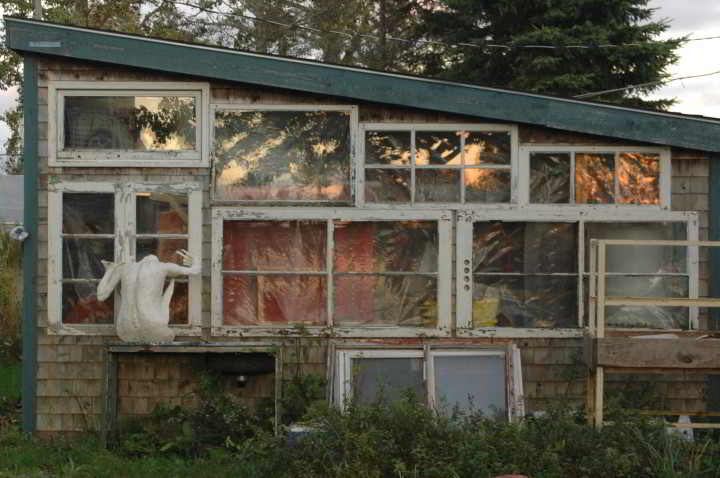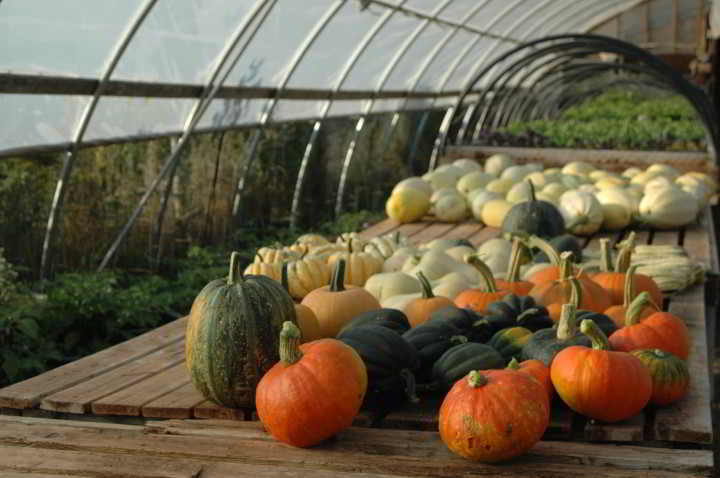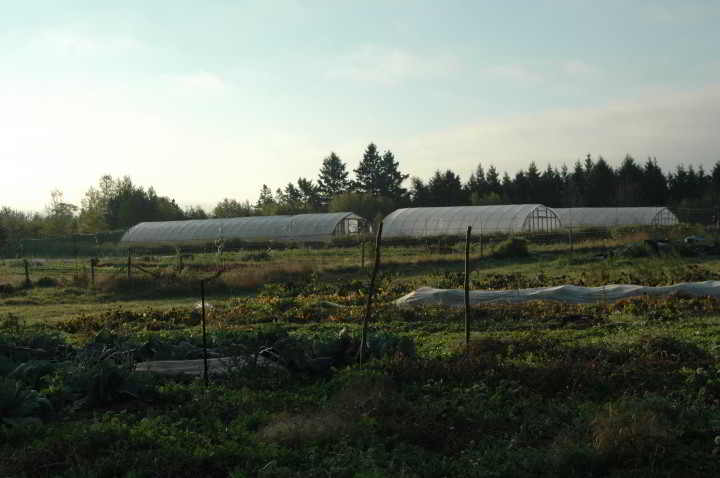Reflections on the seasonal and transient life of farm apprentices and interns by Bernard Soubry.
We had snow the other day in Maitland. I spent a few frantic hours hauling celeriac out of the cold mud and praying that the clouds would break–long enough for us to plant the rest of the garlic in the back field, at least. But after that storm, everything had changed. The farm I’d come to earlier in the season is totally covered now; you can’t work outside without four layers on; the chickens chirp at us angrily in the morning when their water freezes.
Winter’s here, and we’ve lost the luxury of denying it. My farmers and I are all making our own preparations. Owen is greasing and oiling every tool or machine he can get his hands on; Sina is warily prodding the seed catalogues that have just arrived. Me, I’m looking for a place to live for the winter, because I’m leaving.
It happens to me ever time I work a season on a farm: the first big frost descends, and I’m reminded that, for all the energy I’ve put into a place, and no matter how happy life has been there, the season is over—and I have to move on.
I’m not being forced to go; it’s just a part of the agreement I have as an apprentice. I would come to work until December, and then I would go. Such is the nature of the farming apprentice’s life: find a farm that will have you, stay as long as everyone is happy and that there’s work, but leave when one of the two conditions is no longer fulfilled. I understand that. I go into it willingly, if not altogether calmly.
Why go through this moving stress? Part of it is self-imposed. As an apprentice to the craft of farming, I know that part of my education is to find as many ways of doing the same thing, on as many scales as possible. I don’t know how I want to farm yet, and each farmer for whom I work can only conceivably show me their way. You learn through diversification. So you work as many farms as you can, under as many conditions as you can. I need to move because it’s essential to my growth as a farmer.
Part of it, though, is the nature of the farming season: I was hired for a certain period of time. Now that it’s over, my farmers need space and time to do their planning for the next year without having to be hosts or pedagogues. For the past nine months, Four Seasons Farm has been a host to dozens of WWOOFers, short-term workers, long-term interns, apprentices, visitors, and general waifs and strays. Now, at November’s end, it’s not surprising to me that Owen and Sina want their space. I can’t overwinter here without being a stressor to two people who desperately need to be alone with their business plan and some mulled wine. (Perhaps not simultaneously.) I need to move because my contract was temporary, and now it’s done.
But even though I sympathize—and I must insist here that I do—you can already see that the situation poses several fundamental problems.
One: I miss out on one of the most important parts of my farming education. Winter is, or should be, a part of an apprentice’s training: so much of what happens in the art of farming—crop rotations, seed orders, shifts in strategy–is plotted and planned out under cover of winter darkness. As an apprentice, I want to be witness to those decisions and understand the thought process behind them. I can’t do that if I’m bussing tables in the city. If we want apprentices who can become full farmers, we need apprenticeships that go through a full year, and many farms don’t—can’t—offer that.
Two: I have to keep working to survive financially, which means not farming. Farm apprenticeships, despite often coming with room, board, and ridiculously good food, are rarely lucrative. I have the money to survive a few months, but not in a city, and not without supplementing my income. A typical full-season apprentice in Nova Scotia works from March to November, ten hours a day. As an apprentice, I can’t afford to live off the savings I’ve made here for the winter—let alone try to acquire any kind of capital for, say, thinking about land purchase. It’s not exactly conducive, either, to getting a healthy credit history, or acquiring assets for a possible future loan. Farming is a tradition that has often embraced subsistence rather than (financial) wealth, and I accept my lot; but in the falling shadow of the day, even the former seems a long way to go.
Three: For all intents and purposes, the farm I’m working on is my home. This isn’t the case for every apprentice, but it is for many. What it means for me is that, come December, I can either try to find an apartment in Halifax; move all my stuff back to my parents’ house in Quebec; or spend every last penny on a camper van and a shaggy, affable dog and finally be free of domestic troubles. None of these are particularly appealing options. All of them mean leaving what I think of now as home. I’m embarking on an educational journey that attempts to bring strength and knowledge to food systems in the provinces I’ve decided to call my own—does that mean I have to do it in a state of geographical and emotional instability?
Please don’t think I regret my decision, though. At the conference for the Atlantic Canada Organic Regional Network (ACORN) conference last week in Halifax, I actually felt good about my choices. I was in a room where being a farmer was a point of pride, and where my status as an apprentice was celebrated. The Minister of Agriculture for Nova Scotia was there, and he praised us (!) for heralding the future of sustainable agriculture, and promised that his government would support the development of healthy, sustainable food systems and those who worked to create them. Vandana Shiva herself (!!) was there, spurring us on to sow more love, and to support those who wanted to keep food and seed in the hands of the people. All the farmers and community organizers were smart and charming and helpful, and the workshops taught me everything from low-till techniques to marketing strategy. Doing this, devoting my time to apprenticeship, felt not only right, it felt possible.
But sitting in a resource exchange workshop, like Holden Caulfield in front of the Central Park ducks, I asked the eternal question that had arisen in my mind with he first hard frost: “Where do apprentices go in the winter?” And most people laughed. They laughed because, yes, I am a funny and charming person, but mostly because the real, sustainable answer still doesn’t really exist. We had been praised and encouraged, yes, but not supported, I realized. Not in any way that would make me feel safer—financially, geographically, emotionally.
I find myself in a situation where I am devoted to helping develop the province’s most rapidly growing economic output; to constructing stable and sustainable communities, economies, and systems of food sovereignty; and to working as hard as possible as possible to accomplish those goals. I’m part of a group heralded by international leaders as becoming one of the best scientists of today. I am promised support by my provincial government. And yet I’m now faced with learning my trade while being cyclically homeless and financially unstable. Does that sound at all ridiculous to anyone else?
I’m learning to become a farmer; someone who, by nature, fixes problems and overcomes challenges systemically, with elegance and grace and sweat. I know the road isn’t supposed to be easy. It’s part of the job I want to have. And I understand that, as a group, we’re responsible for coming up with the solutions with this. But I don’t think it would be unreasonable to try to make some of those solutions systemic, or accessible to those who want to find them.
Apprentice friends: what are your overwintering strategies? I’m coming up empty here. How do we help ourselves make farming apprenticeship a yearlong, cyclical process? And how do we do it without being left out in the cold?
 Bernard Soubry farms and plots his next move at Four Seasons Farm in Maitland, NS. Want to help him find his next learning and living space? Give him a shout.
Bernard Soubry farms and plots his next move at Four Seasons Farm in Maitland, NS. Want to help him find his next learning and living space? Give him a shout.





I’ve just finished a season long apprenticeship on a farm in BC and faced the same problem (and the other local interns have all just left their farms, mostly to go travelling). The farm here and I have come to an arrangement where I’m sticking around to become a ‘wintern’, and as well as farming, I’m also doing childcare, accounting, building a website, doing some photography (etc etc etc), as well as supplementing my income with off farm work… I’m incredibly lucky to have found a farm that’s willing to work with me on this, and that I have a random and diverse enough range of skills to make it possible. But yes, it’s a huge issue and thanks for writing about it…
Hello Bernard.
Your article hit so many chords with me , as i to have been apprenticing for the last four years or so and every winter i feel as though in experience, education, emotional growth & memories i have gained greatly my wallet just doesn’t agree with me.
Over the years i have been able to farm sit in BC due to the extended warmth but still that only lasts an extra month at best. I guess i have resorted most of my winters to traveling abroad , chasing the growing season i like to say. Australia, Costa Rica, Panama are the places i have spent my last winters, often farm sitting but sometimes just volunteering. And then as the canadian spring begins i usually find the cheapest way to get back to Canada to do it all again.
Have you done any over seas farming? Australia though it is terrifyingly expensive offers amazing opportunities especially in permaculture.
All usually without stipend which can make getting back to canada hard..
Do you usually receive full pay during your apprenticeships or mostly stipend?
I would love to hear about any ideas you came up with to solve this nomadic agrarian problem i find myself facing as well.
Hope all is well,
Dakota
I’ve been interning on farms for two seasons now (both at the same farm, but am looking to move on soon), and I like to use the winter as my time to hit the books. I’m often too tired to motivate myself to read books on soil management and marketing during the season so in the winter I like to hunker down in the library and just read. I am lucky to have friends who let me stay at their house, and to have earned enough to live comfortably until May. I am considering WWOOFing somewhere warm or maybe just using workaway here in Canada, taking care of livestock. I would love to be pulling carrots instead of staring out the window at a fresh foot of snow right now.
Great blog post Bernard! You bring up so many great points. And I have no idea how to solve any of the issues. Here are some of the strategies I used:
During my 6 yrs apprenticing, I apprenticed in the winter too – but at a different farm than wherever I’d been for the main growing season (often in warmer climates but also on a farm that grows and sells greens and storage crops throughout the winter). You’re right that it’s hard to afford living in the city over the winter. One memorable option I took one year: buy a flight to south Florida and apprentice on a farm there (and it was a cheap flight).
I also think it would be amazing to have a directory of farmers that need farm-sitters during the winter (someone with experience like a farm apprentice would be ideal). My partner and I farm-sat during the winter while writing our business plan. It was awesome! And we always wish we had a list of people that could stay at our farm if we went away.
The crop-planning and business management that happen in the winter are super important to learn. I found that many farmers would be interested in having an experienced apprentice start earlier in the season…but by the end of the year, they need a break! There’s often still some crop-planning and business mgmt happening in the very early spring. If you let the farmer know that you are particularly interested in that, it’s easier for them to plan for that.
As you mentioned, it wasn’t easy for my partner and I to get a farm loan for our mortgage, based on low previous years’ income from apprenticing. But, in the end, our experience was the reason the lender gave us the loan.
Well, thanks for your blog post….it’s a great conversation to have!
Hello Bernard,
It was awesome meeting you. Thanks for sharing this post. I think the question you pose is very relevant. I thought the same thing as I spoke with a young farmer who was doing kitchen work and applying for a statistics Canada call-centre job for the winter.
If in the next year, an apprentice wants to start a farm, I think that doing business planning is the best option. All of the successful young farmers I know have done their research and have good business models.
Take care, keep rockin’ it!
Duncan
Great question 🙂
I`m a homesteader (only grow to feed my family) and a small woodlot owner. Managing woodland is a key (often overlooked) factor for farmers and landowners in Canada. Winter time is a great time to work in the woods! Sustainable forest management is just as important and managing soil/summer crops. Wood cutting and prunning crop trees is something farmers should look at investing in and an ideal job for apprentices to help with and learn from. Farmers are a valuable and rare, sustainable minder foresters are even less common – That needs to change!
Aaron
To get started in farming, you basically need two things: knowledge, and money. The unpaid apprentice paradigm which is so common in the organic world can provide some of the former, but fails completely on the latter. In my opinion, a big part of the answer is that established organic farmers need to up their game and develop sufficient profitability to be able to pay fair wages to everyone who works on the farm. This isn’t easy, but it is doable: on our farm (Pleasant Hill Farm in Nova Scotia), workers are paid $12 to $15 an hour, depending on experience and productivity, plus a big sit-down lunch, and eggs and veggies to take home for their personal use. We don’t provide housing, but assist in locating free or low-cost housing in the area. Everyone is covered by workers’ comp insurance, and at the end of the season they’re eligible for EI to help get through the winter.
I’ve heard the argument that there’s a trade-off between having an employer-employee relationship, and being able to acquire knowledge. This is nonsense. All of our workers have access to all of our knowledge, including the financial and business aspects of farming. In the skilled trades, transfer of knowledge from experienced to inexperienced workers is part of the work culture, and nobody is working for free. Imagine the howls of outrage that would come from the organic community if Monsanto or Walmart announced that entry-level employees would be expected to work for just room and board while they learned the basics of the business; yet we’re guilty of much the same thing.
Paying workers on an organic farm IS doable, but it takes commitment. You have to decide you’re going to make it happen, and then develop a financial plan that makes it possible. I think there needs to be a cultural shift in the organic world, where having unpaid workers, so common today, becomes socially unacceptable. When I was growing up in the 1950s and 60s, the majority of adults smoked. An ashtray in every room was normal. Today, far fewer adults smoke, and the reduced social acceptability of smoking is part of the reason. Social pressures can be a powerful agent of change.
In a province like Nova Scotia that’s bleeding away jobs and people, creating meaningful, fairly-paid employment opportunities is one of the most socially useful things anyone can do. As an organic community, let’s step up to the challenge and provide our next generation of farmers with the knowledge AND the money they need to continue building a sustainable and environmentally benign food system.
Hello! At my former company, a blueberry concern, the team survives winters by offering firewood delivery and property management services. I supplemented that by teaching ESL online. We also all had our own homes, which is key to success in farming here. You do what ya gotta do buddy! Good luck figuring out where you fit into that…